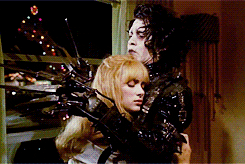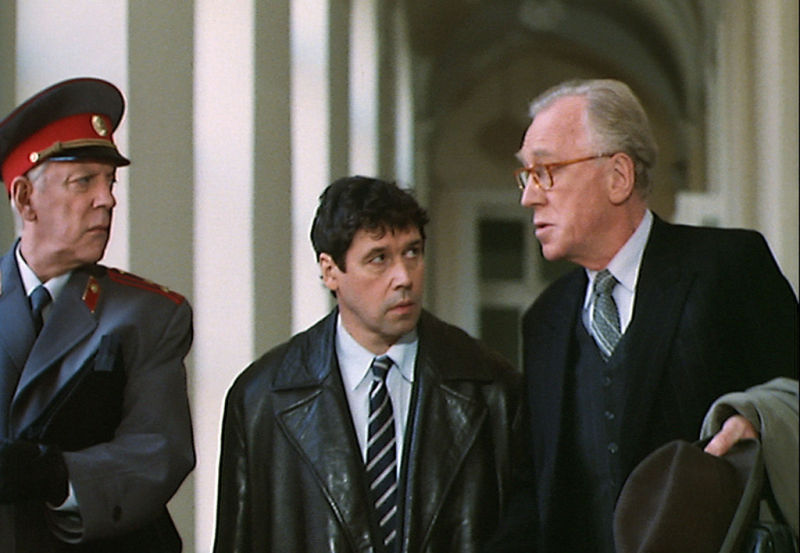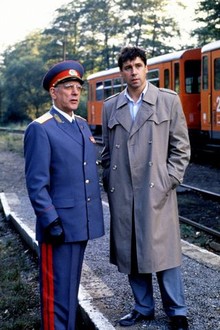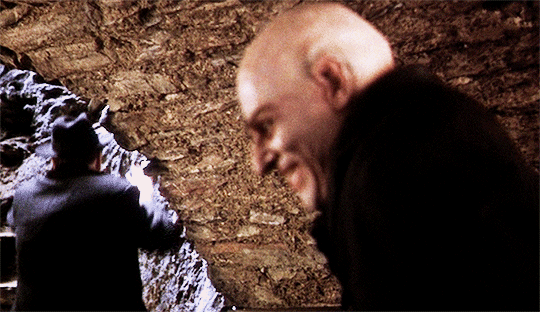"No matter what, Edward will always be special" Peg Buggs proudly declares of her young protege, Edward. Thirty-five years after its release, Edward Scissorhands remains as special to generations of viewers. Blending the gothic with the modern the film serves as an ode to the individual in a conformist world. Carve your own path with Edward Scissorhands.
The story begins with an eccentric inventor creating a living young man whom he names Edward. Unfortunately, the inventor dies of a sudden heart attack before completing Edward's hands, leaving the boy with scissors where his hands should be. Under-socialized Edward is then left to fend for himself until Peg Boggs arrives selling Avon. Kind and optimistic Peg welcomes the young man into her home and invites him to become part of her family. Life with the Boggs' has a profound effect on Edward as he slowly begins to assimilate into their suburban neighborhood. His newfound happiness is soon threatened, however, when several of the locals exploit his trusting nature and threaten to drive him out of town when he tries to defend himself. It is his budding love for Peg's teenage daughter, Kim, that ultimately gives him the strength to remain true to himself amidst the onslaught of duplicity and conformity. What ensues is an ode to the eccentric in us all that is certain to soften even the hardest of hearts.Inspired by Burton's own experiences as an awkward, artistic, teen in Burbank, California Edward Scissorhands is a testament to the power of art and the artist's vital place in society. Through its depiction of Edward's efforts to fit in the film aptly captures the artist's eternal struggle between originality and belonging. Upon his initial arrival he is treated as a local curiosity and his talents are welcomed by bemused neighbors. As the novelty inevitably wears thin, however, his eccentricities devolve from endearing to odd. While he struggles to navigate his new life his missteps begin to garner scorn and suspicion rather than sympathy. Edward's journey from unwitting local celebrity to social pariah mirrors the all too familiar rise and fall of many artists. Much like Edward, many artists are initially embraced for their originality. When familiarity breeds fatigue, however, the very admirers who catapulted the artist to fame will then tear that same artist's work to the ground. Similarly, Edward's struggle between his desperate need to belong and his inability to conform is directly reminiscent of the artist's need and desire for acceptance even as their artistic nature prevents them ever truly fitting in. Even as the town turns on its unusual hero, Edward's legacy lives on through the hearts he inspired, minds he changed, and the unique, inimitable beauty of the snowflakes he created. In this way, the film serves as a heartening reminder of the vital, lasting, importance of art even if it is underappreciated or misunderstood. Fall in love with the artistry of Edward Scissorhands.
The film brings Tim Burton's whimsical vision to unforgettable life thanks to the work of its star-studded cast. Vincent Price blends heart and humor in his brief scene-stealing performance as the inventor. Alan Arkin infuses Boggs family patriarch, Bill, with dry wit and down to earth charm. Diane Weist is a delight as selfless, optimistic, Peg. Anthony Michael Hall is a villain you'll love to hate as Kim's callous boyfriend, Jim. Kathy Baker makes for an apt would-be femme fatale in her by turns sultry and desperate turn as Joyce. O-Lan Jones is hilarious in her hellish performance as religious zealot Esmeralda. Winona Ryder expertly captures Kim's evolution from selfish and impressionable teen to courageous young woman. Johnny Depp turns in arguably the best performance of his iconic career. In his hands, Edward is more than a novelty eccentric or fish out of water and instead that most rare of wonders, a pure-hearted soul.
Thirty-five years after its release Edward Scissorhands remains every bit as original, tender, and inspiring as it's title hero. The script casts a magical spell as it weaves a mesmerizing modern fairytale. The cast bring Burton's vision to heartfelt, unforgettable, life. The film's tagline said "Edward's story will touch you, even if he can't"; nearly forty years later it still does.













